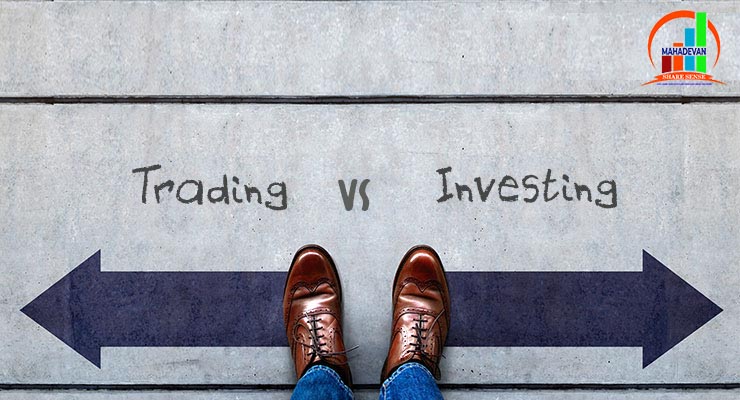

Before you become well-versed with the stock markets and their complex procedures, it is essential to know the difference between trading and Investing. Usually, the newbies in the stock market are not sure which strategy to pick. They end up mixing both with no technical knowledge and lose their hard-earned money in the market. To understand which strategy works best for you, you need to know the basic meaning of trading and investing.
Trading: Trading is the process of buying and selling stocks in the short term for earning fast cash or quick profits. Trading may last from a few seconds to a few hours.
Investing: Investing is the process of buying and then holding the stocks for a long period with no urgent need to sell them for immediate profits. The aim of investing is to hold on to stocks and build wealth in the long run ( 2-4 years ).
The aim of both the traders and investors is the same – to earn profit in the stock market, but the strategies used are different. A trader will use the rise and fill in the market to his/her benefit and will exit at the right time with smaller but continuous profits. On the other hand, an investor will keep holding the shares irrespective of the rise and fall in the market and will wait for the stock to reach its true value or potential.
The real success lies in giving 100% to any task at hand with no room for distractions. If Sania Mirza tried mastery in all the sports, she wouldn’t have been a successful Indian Tennis Player today. Many kinds of research have proved that the human mind is capable of performing a single task with 100% efficiency if done continuously.
Both Investing and Trading require a unique skill set, mental approach, and different set of rules. To be successful in the stock market, you can either be an excellent trader or a classic investor, but it’s very rare to find a good combination of both. The rules of these two strategies are 180 degrees opposite and it’s a tedious task for an individual to apply both of them efficiently. If you apply both methods, your decision-making ability might get affected, especially if you are a beginner in the stock market.
This is the sole reason why many people fail in the stock market and form a negative opinion about it. The real crux lies in choosing the best method that fits your criteria and pulling the trigger at the right time to earn maximum profits. Applying both the techniques with half-baked knowledge will make you neither an investor nor a trader, but a hybrid class who is prone to lose money in the markets. Let us understand the difference between Investing and Trading to help you pick the best option that fits your criteria.
Difference Between Trading and Investing
- The Trading strategy revolves around minimizing the losses to the maximum extent by using the Stop-loss feature. Therefore, in a long position, if the price of a quality share falls to some extent, the trader will exit the trade taking a small loss to minimize the risk in his portfolio.
On the other hand, the Investing strategy is to buy more quantities of quality stock when the price goes down to earn profits in the long run.
If you try to mix both methods, you will not be able to reap their benefits. This will eventually lead to confusion and you may end up losing your hard-earned money.
- In Trading, you trade shares of a company for a short period to earn quick money. The trading feature is about making fast impulsive decisions and not requiring patience.
On the other hand, in Investing, you buy the shares of a good company with strong fundamentals and a robust business model. The company may or may not perform well in the short run but in the long run, you are bound to reap the benefits of your investment.
For example, the share price of MRF has increased from Rs 10 to Rs 82,000 in 28 years. This is the power of investing. Therefore, if an investor tries to act as a trader and tries to play short term, he/she may miss the best benefits of both. A fundamentally strong stock must stay in your portfolio to get maximum ROI ( Return on investment ). Mixing the 2 strategies may result in poor performance and significant losses.
- The aim of the Trader is to generate positive cash flow like other businesses. On the other hand, the Investor believes in investing cash flow i.e. in investing his/her money in a good quality stock for the long term. The investor shows patience and is in no hurry to withdraw the money. The mixing of trading and investing methods makes the cash flow move in and move out of the stock market regularly in an unorganized manner, thereby giving average returns.
- For Traders, the price of the share is the single most input for the generation of profits. Therefore, a trader keeps an eye on the price movement and buys/sells the share at the right time to get maximum gains. On the other hand, the Investors keep an eye on the value of the stock and aim at buying the shares below their fair value, with enough margin for safety. The analysis is different for both the methods and any confusion between the two may lead to unwanted results.
- Trading works with a short-term approach whereas Investing depends on a long-term vision. Both the methods come with their pros and cons and have generated a huge amount of profits for traders and investors. But the key is to understand the functionality of both and then choose the one that matches your goals.
Summing Up
Endless rules and strategies floating in the stock market to generate huge profits. Many of us are also aware of the techniques adopted by the top investors and traders of the world. But why is it that only a small percentage of individuals are tasting the fruit of success in this field? The essence lies in understanding the rules of trading and investing and choosing the best one that fits your goals. One can also apply a mix of training and investing rules but only after considerable experience in the stock market. It is not a beginner’s cup of tea. The secret of success in the stock market lies in focusing on one method at a time.
Investing is a slow and steady process and helps in wealth creation and training is a full-time job. Pick your game wisely.














